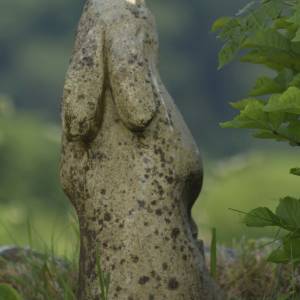No Country for Old Women
Mrs Swift wasn't. In fact, she hardly moved at all. Her main journey seemed to be from the kitchen to the living room and back again. She must have gone upstairs, but I never witnessed this. There was probably a time, years before, when she left the house. But something had happened to stop her. And, aside from one occasion, she lived her life within the confines of her house on St Matthews Street.
Mrs Swift was the standard issue older woman of my memory: sober dress, wrap-a-round pinny with her grey hair permed or demi-waved. The only woman who deviated from this template was Purple-Haired Lady who lived alone on Chomley Street. She had been a professional. A 'professional' what I couldn't say. The vibrant mauve gave her a certain swagger which my sister and I admired. The rest, all the old women of my childhood, looked exactly like Mrs Swift. They were women born at the turn of the century or in the previous one who had survived the great depression only to hurtle into a war-time of austerity that clung to them like dust. They were resilient.
One such survivor was the old lady who lived directly opposite us. She had lived in the street, it transpired, longer than anyone. Each day, dressed in a flimsy mucus-coloured mac, and a green hat at a death-defying angle, she would leave her house to go to town. Her shopping bag, brown and misshapen, hovered an inch above the ground. She seemed tiny. I don't know where she went on those trips, but I do remember her determined walk and wondered how a woman could be so bent and still manage to put one foot in front of the other. When she died, my mother and her friend Alice, laid her out. It transpired she was 98, had lived without her husband for 48 years and always in the same house. She had also once been 5'8". My mother told me this with a kind of wonder as though she'd witnessed a miracle after seeing her finally straightened.
My mother worked in the fish and chip shop on Airlie Street and this gave her a special status that was a combination of agony aunt and social worker. Mr Swift, who seemed to me to be austere, went to buy his and Mrs Swift's supper twice a week. My mother asked the sort of questions that allowed people to talk, deftly providing a platform for sharing. That was how she discovered Mrs Swift's agoraphobia. After that, she always gave him extra chips.
"I don't suppose he mentioned the affairs that drove her to it?" Alice, who also worked in the chippy, said. My mother dismissed this as salacious gossip. Not Mr Swift, he seemed a proper gentleman.
You can read he rest here
- 1
- 0
- Apple iPhone SE
- 1/2500
- f/2.2
- 4mm
- 25

Comments
Sign in or get an account to comment.


